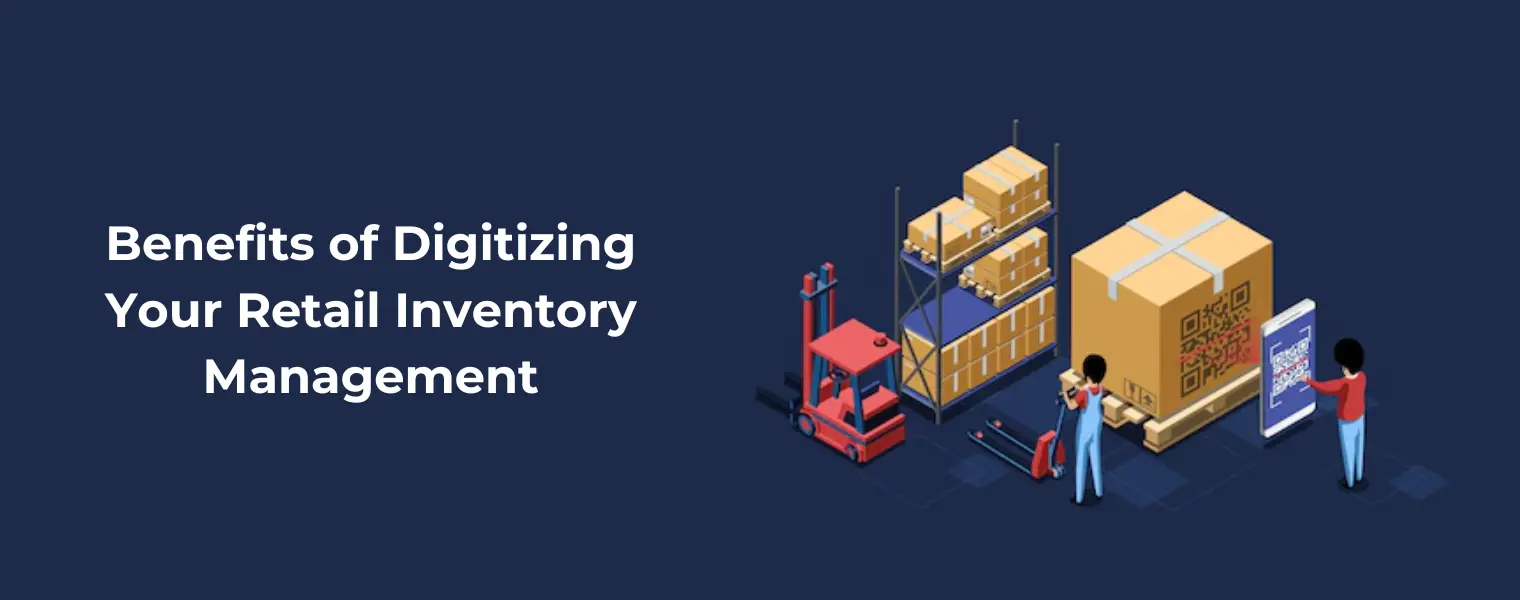
Retail Inventory management software automates and streamlines warehouse processes. It monitors and identifies customer purchasing trends in order to proactively prepare product lists to meet stocking requirements. The digital transformation eliminates any information disparity that could lead to operational uncertainties. Integrated asset tracking devices collect a massive amount of data that can be analysed to gain insights into improving demand forecasting. The system also facilitates the flow of accurate information, which improves overall business efficiency. Manual retail inventory management introduces the risk of human error, which can result in issues such as wastage due to overstocking or lost sales due to inventory stock-out. Another potential issue is failing to identify and correct issues in a timely manner, which results in low productivity, less accurate fulfilment, more returns and shipping difficulties, and dissatisfied customers. All of these issues could be resolved by digitising inventory management.
The most significant advantage of digitising your inventory management is automation. The system automates inventory management and other repetitive tasks from order receipt to preparation and shipping. Inventory tracking is done in real-time with digital tools, which reduces counting errors, saves countless hours, ensures efficient resource utilisation, and allows for better analysis of discrepancies.
Digital inventory management eliminates blind spots, improves communication, and provides real-time visibility into inventory levels, providing precise details on the availability of any given product at any time. When a sale occurs, it also automatically updates your stock count. Thus, automating inventory management may result in increased operational efficiency and improved customer experiences.
A web-based online inventory management solution allows you to access data from various sources. It includes real-time analytics and other advanced tools that allow you to act quickly to capitalise on opportunities and prevent problems from occurring. When order volumes are significantly higher during peak season and holidays, this system allows you to access real-time data on any device and manage inventory from within your warehouse premises and other sites at the same time. As a result, it assists you in understanding sales patterns, making necessary adjustments to stock levels, and keeping up with customer demands regardless of your location.
When you don't have proper inventory control, you could quickly run out of products, resulting in stock-outs. This may cause your customers to wait, lowering their level of satisfaction. They may cancel the order and even refuse to buy from you in the future. When you lose a customer, it has a significant impact on the entire business. It would not only reduce your sales, but it would also result in a squandered marketing budget and customer acquisition costs. An inventory management system monitors stock movement and orders across all of your sales channels. It also allows you to set a standard stock level so that you are always aware of when to replenish it.
In a manually managed inventory, the paperwork investment is substantial. By eliminating this obsolete method, ERP inventory management software reduces these recurring costs. The system analyses your past activity to provide precise forecasts on stock movements, allowing you to achieve more accurate ordering and spending. You would know what products to stock, avoiding costly disruptions by limiting waste associated with too much stock or financial losses associated with under stock, which could cause you to miss sales.
One of the most important benefits of digitising inventory management is that the system integrates all of your sales channels, shipping, and third-party logistics providers, allowing you to access accurate, real-time data across your entire business. The most important criterion for planning more precise orders is an accurate inventory count. A good inventory management system would enable you to make better inventory planning decisions, allowing you to choose products based on their selling capacity and limit your holdings of unsold stock or stock in the wrong locations.
Unexpected challenges are common, but with an inventory management system, you can gain better control over your supply chain and implement a diversification strategy more effectively. Having more vendors reduces the risk of long product wait times when one of the suppliers is unable to deliver on time. As a result, when demand spikes during peak season and other specific periods, you will be well prepared to stock the appropriate amount of goods and avoid stock-outs.
The inventory management system includes tools that allow you to select from a variety of advanced inventory management techniques, such as First in First Out, First Expired First Out, Just in Time, ABC Analysis, and others, that are appropriate for your business setup and focus on driving growth.
Digitized inventory management tools enable you to plan, schedule, and control all warehouse activities. It optimises workflows while streamlining processes, saving employees time and money spent optimising warehouse operations. Inventory management software makes your operations faster and more reliable. You will always be able to fill orders faster and without stock outs. As a result, it assists you in satisfying buyers and gaining more loyal customers.
DoFort provides the best cloud-based ERP software, offering a wide range of industry-specific business management solutions. Our inventory management software includes a simple yet powerful set of tools for tracking inventory movements, optimising warehouse space utilisation, increasing labour productivity, increasing visibility, and expediting order processing. Contact us for more info.
Welcome to DoFort !